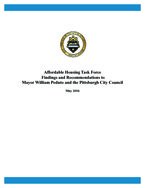Found 21 resources.
0
0
0
During the COVID-19 pandemic, service coordinators played a pivotal role in the support of older adult residents of publicly funded housing properties. Some independent housing operators employ service coordinators to increase residents’ self-sufficiency, physical security, social connections, and the delivery of long-term community-based supportive services. This report presents results from a survey conducted between June 23 and July 17, 2020 to explore the experiences of these service coordinators during the early months of COVID-19. At the time of the survey, about one-third of...
Topics: Community development, Housing, Mental health, Seniors
 Shared by Housing Is
on Dec 3, 2020
Shared by Housing Is
on Dec 3, 2020 0
0
0

Trends in Housing Assistance and Who it Serves
Topics: Community development, Disabilities, Education, Funding, Health, Homelessness, Housing, Legislation & Policy, Low-income, Partnerships, Research, Seniors, Workforce development, Youth
 Shared by Keely Stater
on Sep 10, 2019
Shared by Keely Stater
on Sep 10, 2019 0
0
0
In 2017, the Bipartisan Policy Center and the Center for Outcomes Research and Education (CORE) spoke with over 90 national thought leaders and stakeholders about the current state of rural health care in the Upper Midwest region, including Iowa, Minnesota, Montana, Nebraska, North Dakota, South Dakota, and Wyoming. BPC and CORE used these discussions to determine the real-world implications of existing federal policies, to understand ongoing care challenges, and to identify opportunities for improvement in rural health care access and delivery.
Topics: Health, Low-income, Midwest, Research, Seniors
 Shared by Housing Is
on Jun 12, 2019
Shared by Housing Is
on Jun 12, 2019 0
0
0

The Centers for Medicare and Medicaid Services (CMS) and states spend over $300 billion per year on the care of dually eligible individuals, yet still do not achieve acceptable health outcomes. In a 2016 study of social risk factors in the Medicare value-based purchasing programs, dual enrollment status was the most powerful predictor of poor outcomes. For example, relative to Medicare-only beneficiaries, dually eligible individuals had 10-31 percent higher risk-adjusted odds of hospital readmission across conditions measured in the Hospital Readmissions Reduction Program, and scores were...
Topics: Dual-eligibles, Funding, Health, Low-income, Medicaid / Medicare, Research, Seniors
 Shared by Housing Is
on Apr 24, 2019
Shared by Housing Is
on Apr 24, 2019 0
0
0
In Richmond, Virginia, an interprofessional group of health care students and faculty members is helping seniors solve problems early.
Topics: Dental, Health, Low-income, Mental health, Partnerships, Seniors
 Shared by Housing Is
on Apr 12, 2019
Shared by Housing Is
on Apr 12, 2019 0
0
0

High-need, high-cost (HNHC) individuals are defined as people of all ages living with clinically complex needs and functional limitations who also incur high health care costs or are likely to do so in the near future. Despite frequent contact with the health care system and substantial medical spending, the physical, social, and behavioral health needs of these individuals often remain unmet due to uncoordinated and fragmented care. Studies suggest that HNHC individuals could benefit from a more holistic approach that coordinates the care they receive and addresses their unmet social needs....
Topics: Affordable Care Act, Disabilities, Health, Research, Seniors
 Shared by Housing Is
on Apr 11, 2019
Shared by Housing Is
on Apr 11, 2019 0
0
0
This report focuses on the homelessness and health care use of older homeless adults in New York City, specifically those 55 years of age or older. Recent evidence suggests a unique cohort effect of postWorld War II “baby boomers” born between 1955 and 1965 who have shown a disproportionately high
risk of homelessness over the last two decades.
Topics: Cost effectiveness, East Coast, Health, Homelessness, Housing, Low-income, Research, Seniors
 Shared by Housing Is
on Apr 11, 2019
Shared by Housing Is
on Apr 11, 2019 0
0
0
This report is intended to accompany a report entitled The Emerging Crisis of Aged Homelessness: Could Proposed Housing Solutions Be Funded from Avoidance of Excess Hospital and Nursing Home Costs?, which reports on findings from a multi-site study involving the analysis of data from Boston, Los Angeles and New York City. That report is motivated by recent evidence documenting a cohort effect in the single adult homeless population, wherein persons born between 1955 and 1964 have faced a disproportionate risk of homelessness over the past two decades.
Topics: Cost effectiveness, East Coast, Health, Homelessness, Housing, Low-income, Research, Seniors
 Shared by Housing Is
on Apr 11, 2019
Shared by Housing Is
on Apr 11, 2019 0
0
0
Could Housing Solutions be Funded by Avoidance of Excess Shelter, Hospital, and Nursing Home Costs?
Topics: Cost effectiveness, Health, Homelessness, Housing, Legislation & Policy, Research, Seniors
 Shared by Housing Is
on Apr 11, 2019
Shared by Housing Is
on Apr 11, 2019 0
0
0
While the program has changed very little since its inception, the need for the program has increased. In 1975, the number of program grantees stood at 594. Today, the number of grantees stands at 1,268 as more communities qualify to receive direct program allocations. Based on a CDBG Needs Survey conducted by the CDBG Coalition (and discussed later in this report), CDBG grantees have delayed and canceled projects and reduced or permanently eliminated programs because of a lack of CDBG funds. CDBG is an important investment tool for communities and neighborhoods, but program funding must...
Topics: Community development, Funding, Health, Homelessness, Housing, Legislation & Policy, Low-income, Partnerships, Research, Safety, Seniors
 Shared by Housing Is
on Apr 8, 2019
Shared by Housing Is
on Apr 8, 2019 0
0
0
Type the phrase “aging in place” into a Google search, and you’ll likely see pictures of wheelchairs fitting comfortably through home doorways, bathtubs and showers with zero-step entrances, and open floorplans to facilitate seamless movement from room to room. But what is often missed in discussions promoting aging in place is that increasing livability doesn’t just mean adapting a home’s physical characteristics, it also means ensuring a range of cost options and housing types in a single community.
Topics: Disabilities, Health, Housing, Place-based, Seniors
0
0
0
Affordable housing campaigns are not new, of course, but what is unprecedented and transformative about Opportunity Starts at Home is the scope and diversity of the partners that are joining forces to advocate for more robust and equitable federal housing policies. The campaign is advised by a Steering Committee including leading national organizations representing a wide range of interests that are working shoulder-to-shoulder to solve the affordable housing crisis.
Topics: Asset building, Child welfare, CLPHA, Community development, Early childhood, Education, Food insecurity, Funding, Health, Homelessness, Housing, Immigrants, Legislation & Policy, Low-income, Mobility, Out-of-school time, Partnerships, Racial inequalities, Safety, Seniors, Stability, Substance abuse, Youth
0
0
0
Quality affordable housing can be a “vaccine” which prevents long-term health problems and promotes healthy, productive lives. When a family’s housing situation is unaffordable and unstable, chances to lead a healthy life dwindle rapidly.
Topics: Child welfare, Health, Homelessness, Housing, Low-income, Partnerships, Seniors, Stability
0
0
0
Housing and health systems need to work together. Public housing authorities (PHAs) are significant providers of housing to those in need, offering the health sector scale and expertise. Little was known about how PHAs worked with the health sector writ large. With a national survey, we found that PHAs across the country are engaged in a wide range of partnerships with different health organizations that address various target populations and health priorities. Barriers to housing-health collaboration, such as funding and staffing capacity, can be overcome with cross-system partnerships that...
Topics: Child welfare, Funding, Health, Housing, Low-income, Medicaid / Medicare, Partnerships, Preventative care, Research, Seniors, Smoke-free
 Shared by Housing Is
on Dec 19, 2018
Shared by Housing Is
on Dec 19, 2018 0
0
0
These 65 million older households are highly diverse in their living situations, financial resources, health and functional abilities, and life stages, and thus require different types of housing to meet their needs and preferences. Affordable, accessible housing located in age-friendly communities and linked to health supports is in particularly short supply. Demand for these units will only increase when the baby boomers start to turn 80 in less than a decade. And whether they own or rent, millions of older households struggle to pay for their housing and other basic necessities, and their...
Topics: Health, Housing, Research, Seniors
0
0
0
The Affordable Housing Task Force began with an assumption that there was a compelling need to address the changing landscape of housing affordability in Pittsburgh. Through research, discussion, and community and stakeholder engagement, the Task Force has arrived at recommendations that respond to both the assumption and the realities of affordable housing in the city.
Topics: Community development, Funding, Housing, Low-income, Partnerships, Seniors
 Shared by Housing Is
on Jul 24, 2018
Shared by Housing Is
on Jul 24, 2018 0
0
0
Recognizing the layers to developing a health and housing partnership, this Literature Review and Resource Bank is intended to provide background and data resources that can be used in grant applications or in conversations with potential funders in the effort to foster new health and supportive housing partnerships.
Topics: Cost effectiveness, Criminal justice, Data sharing, Dual-eligibles, Funding, Health, Homelessness, Housing, Low-income, Medicaid / Medicare, Mental health, Partnerships, Post-secondary, Preventative care, Research, Seniors, Substance abuse, Supportive housing, Youth
 Shared by Housing Is
on Jul 13, 2018
Shared by Housing Is
on Jul 13, 2018 0
0
0
The structure of the evaluation is designed around several research domains that, together, provide a comprehensive assessment of the Community-based Care Transitions Program. The research concentrates on the following areas:
• Program Implementation/Operational Issues.
• Beneficiary Participation.
• Provider Participation.
• Utilization and Readmissions.
• Costs/Savings.
• Quality Monitoring and Quality Improvement.
• Unintended Consequences.
Topics: Cost effectiveness, Data sharing, Health, Low-income, Medicaid / Medicare, Partnerships, Seniors
 Shared by Housing Is
on Jul 12, 2018
Shared by Housing Is
on Jul 12, 2018 0
0
0
This report examines four specific aspects of the challenge before us:
• The need for a much greater supply of homes affordable to our nation’s lowest-income seniors.
• The importance of transforming homes and communities so that seniors can age with options, a desire shared by the overwhelming majority of older adults.
• The imperative to better integrate health care and supportive services with housing, recognizing that this integration has the potential to improve health outcomes for seniors and reduce the costs borne by the health care system.
• The need to deploy technologies on a far...
Topics: Cost effectiveness, Funding, Health, Home visiting, Homelessness, Housing, Legislation & Policy, Low-income, Medicaid / Medicare, Partnerships, Place-based, Preventative care, Seniors, Supportive housing
 Shared by Housing Is
on Jul 12, 2018
Shared by Housing Is
on Jul 12, 2018 0
0
0
Topics: Child welfare, Dental, Early childhood, Education, Exercise, Family engagement, Health, Housing, Medicaid / Medicare, Mental health, Nutrition, Partnerships, Place-based, Preventative care, Seniors, Vision
 Shared by Housing Is
on Jul 12, 2018
Shared by Housing Is
on Jul 12, 2018 0
0
0
In December 2016, federal and state policymakers examined the intersection of unstable housing and negative health outcomes at a meeting convened in Washington, D.C., by the National Academy for State Health Policy (NASHP) with support from The Commonwealth Fund. The goal of the meeting was to identify concrete policy recommendations and actionable steps to align health and housing programs to ensure that people with high service needs receive the housing and supportive services they need to become and stay healthy. This report summarizes their findings and recommendations.
Topics: Child welfare, Cost effectiveness, Data sharing, Disabilities, Dual-generation, Health, Homelessness, Housing, Legislation & Policy, Low-income, Medicaid / Medicare, Partnerships, Seniors, Supportive housing
 Shared by Housing Is
on Jul 10, 2018
Shared by Housing Is
on Jul 10, 2018 






